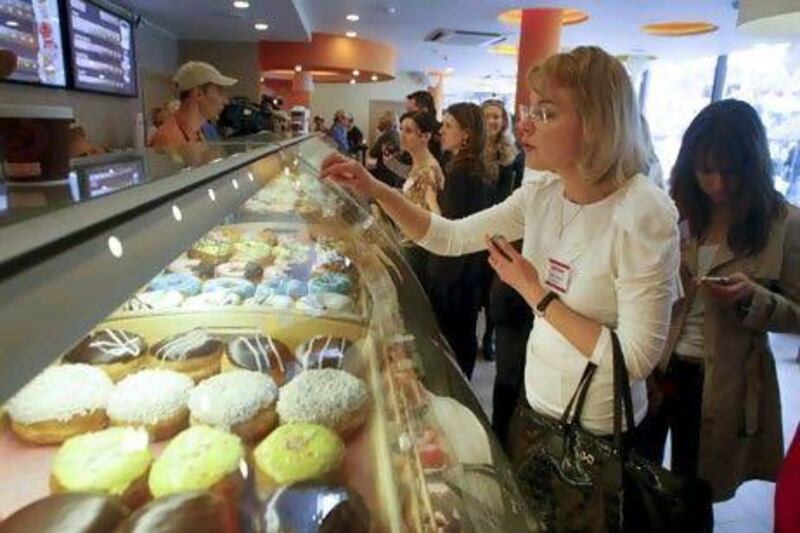Two US coffee titans are squaring up for a turf war in India.
Barely a month after Starbucks formed a partnership with India's Tata Coffee to launch its outlets in the country, Dunkin' Donuts unveiled similar plans to challenge its arch rival.
The US$6 billion (Dh22.03bn) company, owned by the private equity companies Bain Capital, Carlyle Group and Thomas H Lee Partners, announced a franchise deal for an undeclared sum with the Mumbai-listed Jubilant Foodworks to open 500 Dunkin' Donuts outlets around the country in the next 15 years. The first of these is expected to become operational early next year.
Dunkin' Donuts described the deal as its "largest-ever international store-development commitment".
Both rivals have divergent market goals. Starbucks plans to tap into the affluent premium segment, while Dunkin' Donuts is keen to woo the masses.
But their presence follows a common aim: to capitalise on India's growing market for restaurants.
Indians spend an estimated $11.2bn on restaurant meals a year, a market share that has lured several international chains including McDonald's, Yum, KFC, Pizza Hut, Domino's Pizza and Taco Bell in recent years.
"Expansion to India is an integral part of Dunkin' Donuts international growth plan," says Nigel Travis, the chief executive of the company that has 9,700 outlets across 31 countries.
India's young consuming class, with its growing disposable income, offers significant opportunities for investment. The food industry in Asia's third-largest economy is expected to grow to $258bn from the current $181bn in the next four years, the Federation of Indian Chambers of Commerce and Industry says.
The fast-food market is growing at an annual rate of between 25 and 30 per cent, according to a report titled Indian Fast Food Market Analysis, released last September by the market researcher RNCOS.
Food-related businesses attracted foreign direct investments valued at an estimated 5.76 billion rupees (Dh468.9 million) in the eight months to the end of last November, Harish Rawat, the minister of state for food-processing industries, told parliament recently.
Foreign chains are more than willing to customise their brands to cater for a wide cross section of Indian culinary habits.
Jubilant Foodworks, which is also the franchisee for Domino's Pizza in India, Sri Lanka, Nepal and Bangladesh, has added Indian flavours to its menu to entice local customers.
Peppy paneer, a pizza sprinkled with sliced pieces of cottage cheese laced with peppers, and keema do pyaaza, which includes a topping of minced meat marinated in spices, are just some of its localised recipes.
It is a strategy that has paid rich dividends. The group opened 54 of its 364 outlets in the nine months to the end of December alone. Revenues grew by 61 per cent in this period compared with the same period in 2009.
Jubilant Foodworks says it will pursue a similar strategy for Dunkin' Donuts.
To launch a coffee chain in a country where tea is a much preferred beverage may appear a tricky business, but the company says customers should expect to find more than just coffee and doughnuts on its menu.
"Dunkin' provides flexibility in localising recipes and we have food and culinary strengths which we intend to leverage," Shyam Bhartia and Hari Bhartia, the joint chairmen of Jubilant Foodworks, said in a statement.
The chain's sugary treats, observers say, could compete with India's traditional sweets market dominated by millions of family stores. Many of them offer the finest range of regional recipes.
Gulab jamun, a deep-fried dough ball dunked in sugar syrup, melts in your mouth. Mithai - creamy slabs made from condensed milk and clarified butter, and flavoured with cashews, pistachio and saffron - are packed with calories but can be too tempting to resist.
The sweets industry has been buoyed by the low price of sugar, one commodity for which prices have softened because of strong production.
India is the world's top sugar consumer and its second-biggest producer after Brazil. The country's sugar consumption is forecast to touch 23 million tonnes in the year to the end of September, while the output is set to total 24.5 million tonnes, Bloomberg reports.
But growing affluence and aspirations in India are giving rise to new dietary habits and consumption patterns that are troubling the traditional sweets industry.
A 2009 report by the market research agency Datamonitor titled Product insights: Confectionery in India revealed that the growing demand for products such as chocolates and treats from branded chains are fast replacing traditional sweets during Indian festivals.
In 2009, sales of sweets in New Delhi during Diwali - the festival of lights in which sweets are exchanged between families - fell 40 per cent from the previous year, according to a survey by the Associated Chambers of Commerce and Industry of India. The decline since then has continued, experts say.
Sweets are also losing their appeal because of rising cases of obesity and related health conditions, the experts add. India has the world's largest number of diabetes patients at 50.8 million.
A report by Nielsen, the marketing research company, says "aspirational products" such as branded chocolates and confectioneries will drive the future growth of India's consumer products industry.
Cadbury India, a leading confectionery company now owned by Kraft Foods of the US, last month reported a record revenue growth of 27 per cent last year for sales of 25bn rupees.
But no one is predicting the demise of Indian sweets, despite the growing prominence of foreign restaurant chains. And those chains face their own competition.
Dunkin' Donuts, analysts say, faces stiffer competition from Mad Over Donuts, a Singapore-based chain expanding fast in India, and Krispy Kreme, a company based in the US that is also keen to woo India's sweets lovers.





